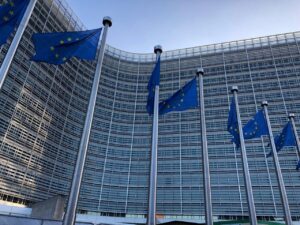Gazprom, the energy arm of Russia’s foreign policy, celebrates its 25th anniversary. Moscow argues that it was a good time for it and the company remains the guarantor of Europe’s energy security. Meanwhile, the central-eastern part of the continent will remember these years as a time of domination and dictating game conditions for European gas consumers. It seems that it is coming to an end – writes Piotr Stępiński, editor of BiznesAlert.pl.
On the occasion of the company’s jubilee, its president Alexei Miller received congratulatory messages, among others from President Vladimir Putin, but also from Prime Minister Dmitry Medvedev, who in 2002-2008 was a member of the board of directors of Gazprom. He, while congratulating the anniversary, said that over the last quarter of the century, the company has become one of the leaders of the global market. In this context, he stated that it is mainly the energy security of not only on Russia, but also on the whole world depends on Gazprom. Is it really so?
The weak credibility of Gazprom
The company’s Western customers, especially those from Central and Eastern Europe, have a different look at Medvedev’s words, who remember the gas crises of 2006 and 2009, when the Russians significantly limited the transit of the raw material through the territory of Ukraine. As a consequence, supplies of gas to European consumers were limited and in some countries, which were most dependent on Russian gas, they were completely stopped. The effects of Gazprom’s gas wars were least affected by the countries of north-western Europe, which pursued a consistent policy of diversifying supply sources and invested in gas connections.
The policy of the Russian company is sometimes unpredictable, which was also experienced by Polish PGNiG. While in the case of the aforementioned crisis in 2009, the official reason for its emergence was the lack of agreement between Ukraine and Russia on the gas supply contract in 2009, it is difficult to understand why in recent years, several times without announcement and reasons Gazprom has reduced the volume of gas supplies for PGNiG. After that, it is possible to recall the situation from June last year when due to the poor quality of gas transmitted through the Yamal Gas Pipeline Gas-System, the company decided to stop the shipment. It is not known whether it was a technical defect but it was another unannounced incident related to limiting the supply of the Russian raw material.
Unannounced incidents occurred also in the case of transit through Ukraine. The Russians repeatedly violated contractual obligations to ensure the minimum pressure at the entry point to the Ukrainian gas transmission system. In addition, there were situations in which the quality of fuel reaching the fuel sent from Russia did not meet the chemical-physical parameters specified in the contract. One can assume that the goal of the Russians is to undermine trust in Ukraine as a transit state.
The actions of the Russians show that, contrary to their assurances, the guarantee of security of supply may at any time become invalid. If the Kremlin were a credible and predictable partner, Brussels would not introduce mechanisms that would harm the interests of a partner, who Gazprom was considered as. There would be no third energy package, which forbade a situation in which one company supplied gas to a given market, was responsible for its transmission and sale. This contradicted the company’s policy of maintaining control over the deposits and transmission infrastructure which the raw material goes to customers in Europe.
The dictate of Gazprom
If the supply of Russian gas to Europe were not at risk, the European Parliament would not review the SoS Regulation in 2017. Thanks to it, any Member State that experiences a gas supply crisis will be able to warn neighboring countries and at the same time launch cross-border assistance and prevent a reduction in supply. After all, if market conditions were dictated, the European Union would not have equipped itself with the possibility of access to gas contracts. Thanks to this, Brussels has an effective tool to force Gazprom to take transparent action on the European gas market and comply with EU law. In the case of unfavorable provisions in gas contracts, it will be possible to change them before the signature with the support of the European Commission, which until now was impossible. The possibility of ex-ante access to gas contracts is a blow to Gazprom’s interests. This allows to improve the position of the European Union countries in the negotiations for the supply of raw material from Russia. Let us recall that in 2015, as a result of the European Commission’s anti-trust investigation, Brussels accused the Russian monopolist of sharing markets, obtaining unjustified influence on infrastructure and offering an unfair price. This concerned Gazprom’s activities towards such countries as Bulgaria, the Czech Republic, Estonia, Hungary, Lithuania, Latvia, Poland and Slovakia.
Europe did not fall in love with Russian gas
The steps taken by the EU are perceived by Russians as sabotaging their activities. Already in 2006, Alexei Miller warned that attempts to limit the activities of the group he directed and the politicization of gas supplies, which only have an economic dimension. At that time, he argued that Gazprom was and will be the main supplier of gas to Europe, guaranteeing security of supply. Twelve years later, in the light of cameras, he informed about further records in gas supplies to Europe. He praised the fact that since the founding of the company, 1,9-fold increased gas exports and last year it delivered 194,4 billion cubic meters to European recipients. The share of the European market reached the highest in Europe index of 34, has 17 percent of global resources of this fuel. – The demand for gas is growing and that is why we are implementing new projects like Nord Stream 2 and Turkish Stream – Miller said last week.
Record supplies were also recorded from the Norwegian direction. According to preliminary data published by the local Gassco transmission network operator, in 2017 gas exports via pipelines from Norway to the Old Continent in comparison with 2016, the volume sent increased by 7 percent. Increased purchases of the Russian raw material are not a sign that Europe particularly liked the fuel delivered by Gazprom. This is a result of the increased demand of the Old Continent for this raw material caused by economic development and the energy and climate policy implemented by Brussels, the assumption of which is the departure of fossil fuels from polluting environment.
Nevertheless, in parallel to gas purchases from Russia, the European Union is consistently starting to make a lesson in building energy security based on the diversification of supply sources. In this context, the key role is played by, among others, the construction of new interconnectors, but also LNG terminals enabling collection from any place on earth. Even over a decade ago, it seemed that Gazprom’s monopoly could not be stopped. The situation has changed. In the United States, another shale revolution has begun and competition from LNG has appeared on the European market. Geopolitical tensions have led some countries to seek alternative suppliers. At the same time, European customers began demanding cheaper contracts, and Gazprom was forced to replace the existing very lucrative contracts with those that are close to market conditions. To secure its market share, the Russian monopoly quietly concluded price agreements with large clients and began to comply with EU rules that it had previously disregarded. The key factor influencing the change in the way Gazprom operates is the perception that Europe has an alternative.
Diversification is the key
The Russians want to maintain their share in the European market. First and foremost, it is possible to sell gas, preferably based on long-term contracts, which will ensure its permanent market. In this context, Gazprom wants to convince Europe to build a controversial and dividing Nord Stream 2 gas pipeline. In its opinion, the Old Continent needs more Russian gas and a new connection on the bottom of the Baltic Sea. This is diversification and security, which is not related to politics, as they try to convince the headlines of Russian media and statements of local politicians. Meanwhile, this is a project that is to make Europe even more dependent on Russian gas and deprive Ukraine of transit as a result of the launch of Nord Stream 2. Gazprom’s representatives do not hide it. In the last conversation with the Rassija 1 channel, the company’s president stated that Nord Stream 2 will become the main corridor for Russian gas supplies from Russia to Europe. At the same time, he stressed that the supply route through Ukraine is losing the important role it played 10-20 years ago.
It is worth noting, however, that since then the European gas market has changed. It changes from the supplier’s market to the buyer thanks to the implemented diversification projects thanks to which the recipients decide where they want to buy the raw material.
Like Poland, which focuses on the policy of reducing dependence on supplies from the east. Thanks to the infrastructure projects implemented by our country, i.e. the expansion of the LNG terminal in Świnoujście and the construction of the Baltic Pipe gas pipeline, from 2022 Poland will have the possibility of obtaining up to 17,5 billion cubic meters of the raw material from non-Russian sources. Theoretically, Poland could give up the services of the Russian company, but it does not cross out the Russian raw material and cooperation with Gazprom. It is possible, but not based on the current assumptions of a long-term contract. In addition, the Russian monopolist must offer clear, transparent conditions.
Price can not be dictated unilaterally and be hostage to political relations between individual capitals and Moscow. Since its inception, Gazprom has served as the energy arm of Russian foreign policy from which the Kremlin has repeatedly benefited. So far, the lack of choice of a supplier other than Russia has been costly for Europe. However, the situation has changed. It will show to what extent Gazprom will adapt to it. So far, despite the declarations, the company has shown that it is an unpredictable partner and can not be an excluded security guarantor. That is why Europe needs an alternative.








